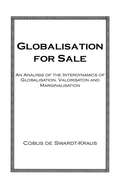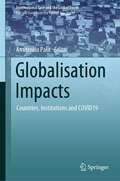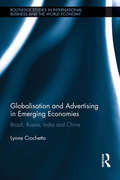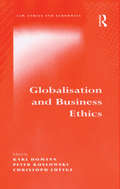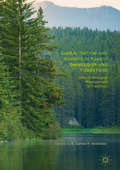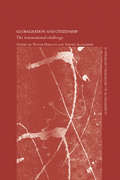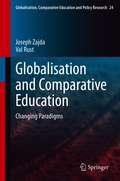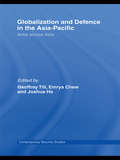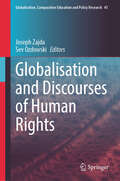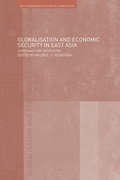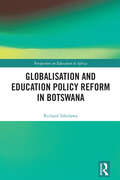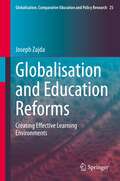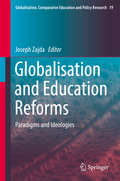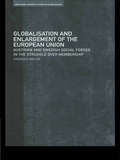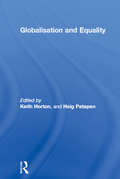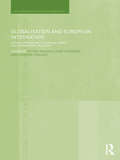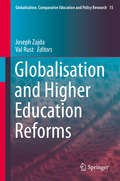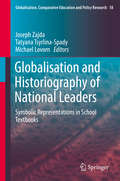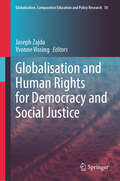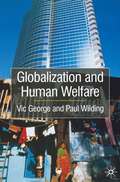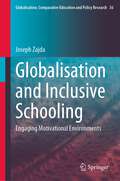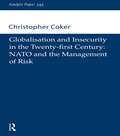- Table View
- List View
Globale nukleare Entwicklungen: Einblicke eines ehemaligen IAEO- Nuklearwaffeninspektors
by Pantelis F. IkonomouDieses Buch wurde von einem ehemaligen Nuklearinspektor der Internationalen Atomenergiebehörde (IAEO) und Experten für nukleare Sicherheit geschrieben und bietet einen umfassenden und authentischen Überblick über die aktuellen globalen Entwicklungen im Nuklearbereich. Der Autor gibt detaillierte Einblicke in aktuelle und vergangene Nuklearkrisen und legt die technischen Fähigkeiten, politischen Strategien und Motive der Besitzer von Atomwaffen offen. Durch die Analyse der Nuklearprogramme und -strategien verschiedener Länder, darunter die USA, Russland, China, Großbritannien und Frankreich, verdeutlicht dieses Buch die bestehende globale nukleare Bedrohung und die damit verbundenen Risiken für die Menschheit. Es beschreibt auch die derzeitigen Blockaden und zeigt mögliche Auswege auf. Aufgrund seines Umfangs wird das Buch Wissenschaftler und politische Entscheidungsträger ansprechen, die daran interessiert sind, neue Einblicke in sensible oder komplexe Nuklearprogramme verschiedener Länder zu gewinnen.
Globaler Katholizismus, Toleranz und die offene Gesellschaft: Eine empirische Studie über die Wertesysteme der Katholiken
by Arno Tausch Stanislaw ObirekDieses Buch bewertet systematisch die politischen und sozialen Werte der mehr als 1,3 Milliarden Katholiken auf der ganzen Welt, der bei weitem größten Konfession des westlichen Christentums. Auf der Grundlage einer umfassenden Analyse von Daten aus dem World Values Survey und anderen globalen Meinungsumfragen wirft das Buch ein neues Licht auf die Wertesysteme und Meinungen der Katholiken. Die Autoren heben zentrale Probleme und Herausforderungen hervor, mit denen die Kirche derzeit bei der Anpassung an die moderne Welt konfrontiert ist, einschließlich des katholischen Antisemitismus, der religiösen und sexuellen Toleranz und der Meinungen zur Demokratie, und bieten gleichzeitig eine anthropologische Reflexion darüber, wie gut sich die Kirche an die Anforderungen einer offenen Gesellschaft anpasst oder nicht.
Globalisation For Sale
by Swardt-KrausFirst published in 2001. Routledge is an imprint of Taylor & Francis, an informa company.
Globalisation Impacts: Countries, Institutions and COVID19 (International Law and the Global South)
by Amitendu PalitThe book reviews globalisation by identifying causes behind the discontent it has produced in recent years. It variously engages in economics, political economy, development and policy discourses to study experiences of countries and institutions in managing and adjusting to globalisation. Extending the analysis to latest global developments, including the remarkable advance of technology and digitalisation, and political and economic upheavals caused by COVID19, the book collects varied academic perspectives and reflects on the present as well as future. Comprising chapters written by distinguished academics and policy experts, the book is a rare collection of cross-disciplinary objective evaluations of globalisation.
Globalisation and Advertising in Emerging Economies: Brazil, Russia, India and China (Routledge Studies in International Business and the World Economy)
by Lynne CiochettoBrazil, Russia, India and China are four of the largest and most dynamic contemporary emerging economies in the world. Strong economic growth in each of these economies has been accompanied by the expansion of the advertising and consumer goods sectors. Using a series of country studies, this book explores the dynamics of global capitalism from the perspective of global advertising. The book highlights the on-going expansion of advertising and consumerism against the wider socio-economic, political and cultural contexts. It provides fresh insights about contemporary global priorities, and argues that advertising plays a key role linking culture and the economy. By presenting individual case studies of advertising campaigns, it offers examples of the globalisation of specific brands. Environmental implications of the expansion of advertising and its role in stimulating consumerism are explored in the context of the four emerging economies. The book compares and contrasts the individual country profiles, and makes an assessment of the validity of the argument regarding their projected importance and the likelihood of their future dominance of the global economy.
Globalisation and Agricultural Landscapes: Change Patterns and Policy Trends in Developed Countries
by Jørgen Primdahl Simon SwaffieldWhilst agricultural landscapes are products of the local ecosystem and community in which they are situated, they are becoming increasingly affected by the same global issues, and are converging under the dynamics of globalisation. Combining landscape ecological research and an examination of relevant public policy, this book investigates the dynamic relationship between agricultural landscapes and the global change processes, such as urbanisation, by which they are being transformed. Landscape change is analysed in the context of biophysical patterns, market dynamics, and specific public policy frameworks, through a series of case studies from different OECD countries spanning Europe, Asia Pacific and North America. Particular emphasis is placed upon the way that landscapes are changing under differing policies of agricultural subsidy including the EU Common Agricultural Policy. This is an ideal resource for graduate students and researchers in landscape ecology and agriculture as well as policy analysts working in the agricultural sector.
Globalisation and Business Ethics (Law, Ethics And Economics Ser.)
by Peter Koslowski Karl HomannGlobalization has become a common phenomenon, yet one that many people experience as a threat not only to their economic existence, but also to their cultural and moral self-image. This volume takes an interdisciplinary approach to provide a theoretical overview of how business ethics deals with the phenomenon of globalization. The authors first examine the origins and development of globalization and its interaction with business ethics, before discussing the impact on and role of national and multinational corporations. The book goes on to examine the relationship between industrialized and developing countries, and explores the place of ethics in globalized markets.
Globalisation and Change in Forest Ownership and Forest Use
by E. Carina KeskitaloThis book describes the changing landscape of European forest ownership and explores the impact a new, often urban, generation of forest owners may have on the future of one of our most basic resources – forests. Forests have not played a major role in rural studies thus far, however they constitute an important part of many rural areas. Drawing on Swedish cases and comparison cases from various other areas of Europe, the authors present these ‘new forest owners’ as a pivotal factor in the changing relationships between urban and rural life. The chapters explore how forest production, the relationship to the environment, urban-rural relations and local communities have already changed as well as discussing what might be expected for the future. A result of work in the Swedish research programme PLURAL and related projects, such as the EU Cost Action FACESMAP, this volume will be of interest to scholars of forestry and rural studies, as well as to researchers in environmental, population and globalization studies more broadly.
Globalisation and Citizenship: The Transnational Challenge (Challenges of Globalisation)
by Steven Slaughter Wayne HudsonThis wide-ranging volume explores the impact of globalization upon citizenship, with a special focus on the transnational challenges that globalization poses. While there is much debate over the concept, globalization implies at least two distinct phenomena. First, it suggests that political, economic and social activities are becoming increasingly inter-regional or intercontinental in scope. Secondly, it suggests that there has been an intensification of levels of interaction and interconnectedness between states and societies. Citizenship, as one of the foundational concepts of the modern liberal democratic states, provides the normative framework within which globalization debates may be understood and evaluated. It also examines how different concepts, theories and practices of citizenship are evolving in response to globalization. Central questions explored in this text are: • How does globalization challenge traditional conceptions of citizenship in specific respects?• How is globalization creating new citizenships or new civil society spaces?• How is transnational citizenship developing and what problems are associated with it in specific areas? Discussing the theoretical and practical prospects for new forms of liberal, republican and cosmopolitan citizenship, Globalisation and Citizenship will appeal to students and scholars in the fields of international relations, globalization, sociology and political science.
Globalisation and Comparative Education: Changing Paradigms (Globalisation, Comparative Education and Policy Research #24)
by Joseph Zajda Val RustThis book focuses on discourses of globalisation in comparative education research and the politics of education reforms. It analyses and evaluates the shifts in methodological approaches to globalisation and education reforms, as reflected in comparative education research and their impact on education policy and pedagogy. The book covers topics such as globalisation and comparative education, globalisation as a multidimensional construct, methods and methodologies in comparative education, the moral face of post-structuralism, and school reforms in the age of globalisation. It offers a critical analysis of education policy reforms.The book demonstrates a complex nexus between globalisation, ideology and education reforms. On one hand, democratisation and progressive pedagogy is equated with equality, inclusion, equity, tolerance and human rights, while on the other hand, globalisation is perceived – by some critics at least – to be a totalising force that is widening the socio-economic status (SES) gap and cultural and economic capital between the rich and the poor, and bringing power, domination and control by corporate bodies and powerful political, economic and educational organisations. The perception of globalisation as dynamic and multi faceted processes clearly necessitates a multiple perspective approach in the study of comparative education globally. This book contributes in a very scholarly way, to a more holistic understanding of the nexus between globalisation, comparative education research and education reforms.
Globalisation and Defence in the Asia-Pacific: Arms Across Asia (Contemporary Security Studies)
by Geoffrey Till Emrys Chew Joshua HoThis edited volume examines the impact of globalisation on the economies, security policies and military-industrial complexes of the Asia-Pacific region. The work is structured into three main parts. The first explores globalization and its general effects on the policy-making of the nation-state; the second section looks at how globalisation affects a country’s threat perception and defence posture within the specific context of the Asia-Pacific region; while the third explores how it impacts on a state’s allocation of resources to defence, and how economic globalization affects the defence industry, with specific reference to the procurement policies and practices of different states across the Asia-Pacific.
Globalisation and Discourses of Human Rights (Globalisation, Comparative Education and Policy Research #45)
by Joseph Zajda Sev OzdowskiThis book examines dominant discourses in human rights education globally. Using diverse paradigms, ranging from critical theory to discourse analysis, it examines major human rights education reforms and policy issues in a global culture. It also focuses on the ambivalent and problematic relationship between human rights education discourses, ideology and the state. The book discusses democracy, ideology and human rights, which are among the most critical and significant factors defining and contextualising the processes surrounding human rights education globally. It critiques human rights education practices and policy reforms, illustrating the shifts in the relationship between the state, ideology, and human rights education policy. The book also examines developments in research concerning human rights education. Readers will gain a more holistic understanding of the nexus between human rights education, and dominant ideologies, both locally and globally. The book also provides easily accessible, practical yet scholarly insights into international concerns in the field of human rights education in the context of global culture.
Globalisation and Economic Security in East Asia: Governance and Institutions (Routledge Studies in Globalisation)
by Helen E. S. NesaduraiWhat is the relationship between globalization and economic security? Globalisation and Economic Security in East Asia is an incisive new engagement with this important question that uses detailed conceptual exploration and fresh empirical analysis. Viewing traditional neorealist conceptions of economic security as overly narrow, this new study suggests that any conception of economic security in the contemporary era needs to also pay close attention to the nature of global capitalism, and the insecurities it generates for societies and individuals. This uniquely open-ended approach to conceptualizing economic security is supported by the East Asian experience. The country case studies included here reveal that while economic security has largely been posed as one of ensuring sustainable economic growth and equitable social development, particularly following the 1997 to 1998 Asian financial crisis, other, more realist conceptions of economic security have not become irrelevant. This is also an exploration of whether and how national, regional and multilateral institutions, as well as non-state regional mechanisms, help policy makers meet the task of governing in the interests of economic security. This book will be of great interest to all students and scholars of international relations, international political economy of East Asia globalization and security studies.
Globalisation and Education Policy Reform in Botswana (Perspectives on Education in Africa)
by Richard TabulawaThis book uses the global–local dialect approach to explicate education policy reform in Botswana and interrogates the practical effects of the various education policies on curriculum, pedagogy and governance of the Botswana General Education system. Considering the effect of three reform policies since Botswana’s Independence in 1966, the book evaluates the performance of each of the policies and examines their consequences in terms of the interplay of global forces and domestic pressures. The result of this interplay has been an education landscape that, while reflecting globally circulating education discourses, markedly differs from those same discourses. The book argues that the State in Botswana has appropriated education policy to legitimate itself in times of crisis and that each policy has improved access to general education but, collectively, have failed to improve its quality, making suggestions for how this can be improved in the future. As the first book of its kind to delve into education in Botswana from a single-authored critical lens, the book will be a highly relevant reading for academics, researchers and post-graduate students of African education, comparative education, education policy and curriculum studies.
Globalisation and Education Reforms: Creating Effective Learning Environments (Globalisation, Comparative Education and Policy Research #25)
by Joseph ZajdaThis book analyses discourses of effective learning environments globally. It focuses on the student’s cultural identity and academic achievement, the significance of cultural and social capital to student’s academic achievement, motivational strategies enhancing engagement and performance, effective teaching strategies, and quality in education for all. The book discusses and evaluates the shifts in methodological approaches to effective learning environments and globalisation. It analyses such topics as the students’ cultural identity and achievement, motivational strategies for creating effective learning environment, constructivist pedagogy for critical thinking, dimensions of discrimination in schools globally, intelligence testing and the effects on academic achievement, and values education in the classroom. The book evaluates the shifts in methodological approaches to globalisation and effective learning environments globally, and their impact on education policy and pedagogy. It contributes in a very scholarly way, to a more holistic understanding of the nexus between globalisation, comparative education research and effective learning environments education reforms.
Globalisation and Education Reforms: Paradigms And Ideologies (Globalisation, Comparative Education And Policy Research Ser. #19)
by Joseph ZajdaThis book explores the interrelationship between ideology, the state, and education reforms, placing it in a global context. It examines some of the major education reforms and policy issues in a global culture, particularly in light of recent shifts in quality and standards-driven education, and policy research. The book critiques the neo-liberal ideological imperatives of current education and policy reforms, and illustrates the way the shifts in the relationship between the state and education policy affect current trends in education reforms and schooling globally. With this as its focus, the book’s individual chapters highlight hand-picked scholarly research on major discourses in the field of comparative education. A compendium of the very latest thinking on the subject, the book – like the other volumes in the series – offers a state-of-the-art sourcebook for researchers, practitioners and policymakers alike. Not only do the chapters offer a timely overview of current issues affecting comparative education and education policy research in what is now a global educational culture; they also outline future directions that education and policy reforms could take. By doing so, they provide a comprehensive picture of the intersecting and diverse discourses of globalisation and policy-driven reforms in education. Individual chapters critically assess the dominant discourses and debates on education and policy reforms. Using diverse comparative education paradigms from critical theory to historical-comparative research, they address globalisation, ideology and democracy and examine both the reasons for and outcomes of education reforms and policy change. As such, they provide an informed critique of models of quality and standards-driven education reforms that are informed by Western dominant ideologies and social values.
Globalisation and Enlargement of the European Union: Austrian and Swedish Social Forces in the Struggle over Membership (Routledge Studies in Globalisation)
by Andreas BielerOn January 1 1995, Austria and Sweden joined the European Union (EU). This book examines why these two countries joined at such a moment and studies their accession against the structural background of globalization. In this cutting-edge analysis, Andreas Bieler argues that conventional neo-functionalist and intergovernmentalist theories fail to explain such structural change as they take existing power structures as given. Therefore, he develops a neo-Gramscian perspective as an alternative approach to European integration.
Globalisation and Equality (Challenges of Globalisation #Vol. 1)
by Keith Horton Haig PatapanIs globalisation creating a more unequal world? Is it creating new forms of inequality? Does it make certain pre-existing forms of inequality more morally or politically significant than they would otherwise have been?Globalisation and Equality examines these and related questions, exploring the way increasing globalisation is challenging our conceptions of equality. The contributors explore these themes from both theoretical and empirical perspectives. Some adopt a more abstract approach, exploring foundational questions concerning the meaning of equality, its social and political dimensions, and more specifically its moral implications in a global context. Others engage the general themes of globalisation and equality by focusing on specific topics, such as welfare, citizenship, gender, culture, and the environment.Original in the questions it poses, and interdisciplinary in its approach, this collection of essays will appeal to all those with an interest in globalisation and equality.
Globalisation and European Integration: Critical Approaches to Regional Order and International Relations (Routledge Studies in Globalisation)
by Amy Verdun Henk Overbeek Petros Nousios Andreas TsolakisThis book explores the links between European integration and globalisation, and examines the potential for social transformation in the context of the global economic crisis and the resulting EU reforms. Divided into three parts, this book offers both empirical and theoretical analyses of social integration, supranationality and global competition. Drawing on Critical Political Economy research, Neo-Gramscian, Open Marxist, Regulationist and Post-structuralist scholars subject a wide range of European flagship policies in matters of competition, trade and security to critical scrutiny and relate them to global political economy dynamics. Contributors examine the ways in which current global economic turbulence has affected the European Union, its membership and its adjacent areas, and determine the potential for economic and political transformation in light of the global economic crisis and Europe’s 2020 Strategy. In the emerging multi-polar world, in which the EU and the US are expected to share global policymaking with new powers, this book argues for a revised conceptualisation of European integration and its relationship with globalisation. Globalisation and European Integration will be of interest to students, scholars and researchers of globalisation, political economy, international relations, and European Union politics.
Globalisation and Higher Education Reforms
by Joseph Zajda Val RustThis volume explores the interrelationship between ideology, the state and higher education reforms, setting it in a global context. It examines some of the major higher education reforms and policy issues in a global culture, particularly in the light of recent shifts in quality and standards-driven education and policy research. In doing so, the book provides a comprehensive picture of the intersecting and diverse discourses of globalisation and policy-driven reforms in higher education. Representing scholarly research on major discourses in the field of higher education reforms, the book draws upon recent studies in the areas of globalisation, equality, and the role of the state in higher education reforms. It critiques the neo-liberal ideological imperatives of current higher education and policy reforms, and illustrates the way that shifts in the relationship between the state and higher education policy affect current trends in higher education reforms. Individual chapters critically assess the dominant discourses and debates on higher education and policy reforms. Using diverse comparative education paradigms from critical theory to historical-comparative research, the chapters focus on globalisation, ideology and higher education reforms and examine both the reasons and outcomes of higher education reforms and policy change. "Anyone who has been involved in higher education over the past few decades cannot fail to be affected by the impact of globalisation and neo-liberal policies on universities and society at large. In 'Globalisation and Higher Education Reforms', the 15th volume of the series 'Globalisation, Comparative Education and Policy Research', Joseph Zajda and Val Rust present chapters on education reform in the USA and in international contexts that highlight the inroads that neo-liberalism has made into policy making at higher education institutions. The chapters also illustrate the way universities have been reinventing themselves to meet the demands of a knowledge society in which corporate values of efficiency, performance and managerialism drive the agenda. What are the effects of internationalisation on higher education in the universities of today? With chapters from internationally respected scholars from around the globe, this book seeks to address the many issues of the new reality in higher education. This is a welcome, accessible volume for all those concerned with research, policy-making and curriculum development. " Professor Suzanne Majhanovich, Western University
Globalisation and Historiography of National Leaders
by Joseph Zajda Tatyana Tsyrlina-Spady Michael LovornGlobalisation and Historiography of National Leaders: Symbolic Representations in School Textbooks, the 18th book in the 24-volume book series Globalisation, Comparative Education and Policy Research, explores the interrelationship between ideology, national identity, national history and historical heroes, setting it in a global context. Based on this focus, the chapters represent hand-picked scholarly research on major discourses in the field of history textbooks and symbolic representations of national heroes, and draw upon recent studies in the areas of globalisation, history textbooks, and national leaders. A number of researchers have written on the importance of teaching national history in order to foster national identity and a sense of belonging to a certain society, state, and people among the younger generation. Some nations prefer to create national heroes out of their political leaders who are still in power, and whose lives and reputation are portrayed as being eminently spotless. Using diverse comparative education paradigms from critical theory, social semiotics, and historical-comparative research, the authors analyse the unpacking of the ideological agenda hidden behind the choice and lionization (or silencing) of the preferred national heroes. They provide an informed critique of various historical narratives depicting national leaders and national heroes. The book provides an easily accessible, practical yet scholarly source of information on international concerns in the field of globalisation, history education and policy research. Offering an essential sourcebook of ideas for researchers, history educators, practitioners and policymakers in the fields of globalisation and history education, it also provides a timely overview of current changes in politically correct history education narratives in history textbooks.
Globalisation and Human Rights for Democracy and Social Justice (Globalisation, Comparative Education and Policy Research #50)
by Joseph Zajda Yvonne VissingThis book analyses major discourses of human rights for democracy and social justice. The chapters contained in the book examine critically major issues confronting human rights for democracy and social justice both locally and globally. The chapters analyze the challenges that different societies are confronted with, as they attempt to implement, protect and defend democracy, cultural diversity and human rights in an ever-changing world, and culturally diverse environment. Topics covered include dimensional concerns for social justice and human rights and what to do about them, human rights for democracy and social justice, and celebrating cultural diversity in sport. The book will help readers to explore their own views and consider more broadly what may be in the best interests of a fair and just society, as envisioned in human rights treaties, human rights education in schools, and cultural diversity.
Globalisation and Human Welfare
by Vic George Paul WildingThis thematically structured text offers an ideal introduction to the positive and negative effects of globalization on human welfare in industrial and developing societies. It documents the effects of globalization on economic growth, income distribution, poverty, education, health, social care and the environment. It pays special attention to the effects of globalization on ethnic and gender issues and concludes with an assessment of the possibilities of global social policy. It will appeal to undergraduates in the social sciences both as a basic text and a reference book.
Globalisation and Inclusive Schooling: Engaging Motivational Environments (Globalisation, Comparative Education and Policy Research #36)
by Joseph ZajdaThis book analyses discourses of inclusive schooling and engaging motivational environments globally. It focuses on the student’s identity, belonging, performance in the classroom, and the significance of cognitive, cultural, emotional and social capital to student’s academic achievement. The book discusses and evaluates the shifts in methodological approaches to inclusive and engaging learning environments. It analyses topics such as the students’ cultural identity and achievement, motivational strategies for creating engaging learning environment, the use of constructivist pedagogy for critical thinking, social constructivism, and values education in the classroom. The book also analyses and evaluates the shifts in methodological approaches to globalisation and inclusive schooling globally, and their impact on performing schools. It contributes in a very scholarly way, to a more holistic understanding of the nexus among globalisation, comparative education research, inclusive schooling and engaging learning environments.
Globalisation and Insecurity in the Twenty-First Century: NATO and the Management of Risk (Adelphi series #345)
by Christopher CokerDiscusses the impact of globalisation on security in the West and in particular the way it has changed the nature of NATO as well as its security agenda.


